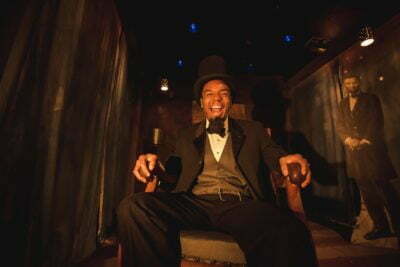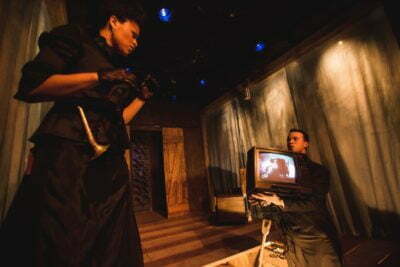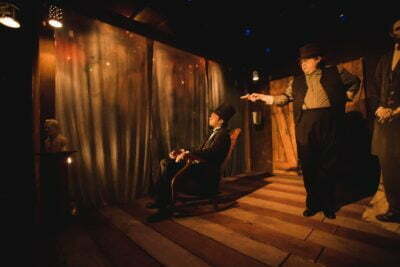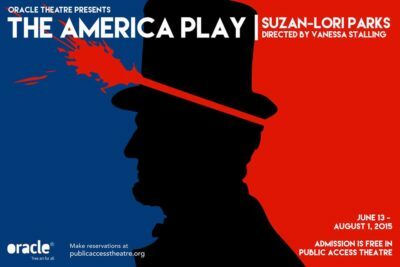The America Play
Directed by Vanessa Stalling
Produced by Oracle Theatre, Chicago
“Everyone who has ever walked the earth has a shape around which their entire lives and their posterity shapes itself.”—The Foundling Father
Oracle Plunges Into a Great Hole
James Baldwin’s metaphorical description of writing as archaeology had a big impact on Suzan-Lori Parks early in her career. So, too, did a visual image that occurred to her early in the nineteen-nineties: that of a black Lincoln impersonator being shot in the head by a paying customer. She later developed this image into the story of the two brothers, Lincoln and Booth, in Topdog/Underdog, which won her the Pulitzer Prize for Drama in 2002. But ten years earlier, she used it as the basis for her much less story-driven, highly esoteric work The America Play, now being produced at Oracle. Written at the height of post-modernism, The America Play is a study of African-American historiography and how it relates to identity. But if you choose to see this play, it definitely helps to know a lot more about it than that.

Our main character, the Foundling Father (Tavis Delgado) is a Lincoln impersonator who lives in a great hole. Meaning, he has created a replica of “The Great Hole of History,” a historical reenactment themed amusement park he enjoyed attending with his wife, Lucy (Jessica Dean Turner), but further out west, and suited for his one-man performance. His room is meant to represent a box at Ford’s Theatre. For a penny, a customer may select an unloaded gun, point it at the Foundling Father’s head, pull the trigger, and hear a loud bang as he slumps over. Why does he do this? Well, people the Foundling Father encountered always told him he bore a strong resemblance to Lincoln, and he spent his life searching for a way he could follow in the “Great Man’s” footsteps, connect with him somehow, and learn from the whispers of the dead. Those whispers are very real; he and Lucy, who is a confidant to the dying, used to hear the memories of the past playing in their heads over and over all the time at the Great Hole. When he saw the actors break character to rise from death and bow, he knew he’d found his way of channeling Lincoln.

He tells us all this very directly, and we’ll hear it many more times. The play is split into two scenes, and after meeting the Foundling Father, we flash forward in time to Lucy and their son, Brazil (Tony Santiago). She still hears the echoes of the past, and is now looking for the ghost of her long-gone husband. It was his wish that Brazil be raised as a “weeper,” a professional mourner, but Brazil enjoys “faking” of all sorts. Now, he’s excavating for relics of his father, the opposite of how his father was a gravedigger. Their hope is to finally give the Foundling a proper funeral.
Since Parks was interested in exploring history, this play has very little action; we just hear these characters’ histories over and over again, with a few variations. They frequently quote or paraphrase from Lincoln’s era, but at one point, the Foundling Father recites a bit of poetry that Parks’s footnote in the script informs us if from his own unpublished work. That’s the sort of academic humor at work here. The three main actors all have a keen understanding of the absurdist nature of the play. Delgado is a wistful, but forceful and persuasive Foundling Father, which perhaps is what invited the Lincoln comparisons. Jessica Dean Turner’s Lucy is peevish, but lovable, and Tony Santiago’s Brazil is earnestly ebullient. Rory Jobst and havalah grace show up a few times as assassins or whispers of the past to provide a little spice when the other characters need inspiration.

Director Vanessa Stallings presents the material with the right playful, but thoughtful, tone for absurdism. James V. Ogden’s simple, but surprise-laden scenic design is one of the best I’ve seen at Oracle, and Joan Pritchard’s costumes bring the spectacle to a work about turning history into dramatic images and brief soundbytes. The question is, does a nearly actionless existential musing on history told through an ironic African-American vernacular interest you? I was intrigued enough by the production to read the The America Play afterwards, and found the reflection and repetition drastically improved my experience. Oracle has a very loyal audience of people who are highly educated in the philosophy of history and dramatic theory. They will probably be pleased with this latest offering. To everyone else, I hope this review provided a bit of context and preparation.
Recommended
Jacob Davis
3jacob.davis@gmail.com
Reviewed June 13, 2015
This show has been Jeff recommended.
For more information, see The America Play’s page on Theatre in Chicago.
Playing at Oracle Theatre, 3809 N Broadway, Chicago. Admission is free; to reserve seats, see publicaccesstheatre.org. Shows are Fridays, Saturdays, and Mondays at 8:00 pm, and Sundays at 7:00 pm through August 1. Running time is eighty minutes with no intermission.

